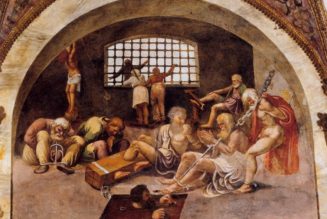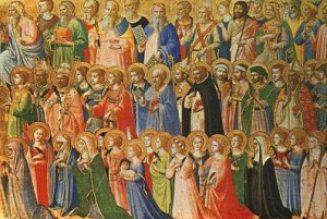
Jesus tells us that if we invest his talents well here and now it will mean a fuller life now and for eternity, in the Parable of the Talents on the 33rd Sunday in Ordinary Time, Year A.
Good to know. One question, though: How does one “invest” God’s talents?
Jesus explains what he means in the parable itself, but the Church helpfully provides excellent clues in the other readings this Sunday.
This parable is the reason we use the word “talent” the way we do.
In the ancient world, a “talent” was a weight of measurement, with the implication being a measure of a valuable metal; maybe silver or gold. But now, because of this talent, we use the word to mean “the God-given aptitude for an excellence.”
In the parable, these talents are not equally distributed. One servant gets five, another gets two and a last servant gets one. When the master returns “after a long time” he settles his accounts. The two who received more than one have each doubled their talents through wise investing and hear in reply, “Well done, my good and faithful servant. Since you were faithful in small matters, I will give you great responsibilities. Come, share your master’s joy.”
This is very consoling: It means that whether you are highly talented or moderately talented, all that is expected of you is to make the most of what you have.
The servant who receives only one talent, however, returns the talent without having used it. His excuse is that he knew that his master was “demanding” and that his master could also miraculously accomplish what he needed to accomplish without him, “harvesting where [he] did not plant.” The master calls him “You wicked, lazy servant!” and commands, “throw this useless servant into the darkness outside, where there will be wailing and grinding of teeth.”
This is not very consoling. Many of us feel exactly the way he does: We know God’s way is demanding, and we tell ourselves, “Surely, he will cut us some slack since he knows that what he is asking for is difficult!” We are also certain that God can do what needs to be done without us.
Jesus told this parable, and the Church placed it in this position, in the final week of the liturgical year, to tell us that we’re wrong. Jesus expects us to do something with all he has given us. Our excuses will fail.
So — what “something” are we supposed to do?
First: recognize that we need others, and that others need us.
The Catechism makes two keen observations that are important in examining this parable: Fist: However talented I am, it’s not enough to live a full life. Second: The same is true of everyone around me.
“On coming into the world, man is not equipped with everything he needs for developing his bodily and spiritual life. He needs others,” it says. Some of us need even more, it adds, because “The ‘talents’ are not distributed equally.” God’s plan is “that those endowed with particular ‘talents’ share the benefit with those who need them.”
This helps clarify the parable quite a bit, because Jesus in the parable talks about fidelity in “small matters” leading to greater “responsibilities.” He means that our talents are not for us, but for others — or, to put it another way, that we are meant to live our state in life generously.
The other readings show the “small matters” and bigger “responsibilities” that come in ordinary life.
To drive home Jesus’s point, the Church embedded this week’s Gospel in readings that show the power of ordinary people doing ordinary things. The “Proverbs wife” in the First Reading is not a wife who goes above and beyond what a wife should do, but a wife who does very well the things a wife is expected to do. She is careful about the household economy, and contributes to it, all while helping the needy in the larger community.
The implication of this passage is that the husband, too, is fulfilling his state in life well. That’s what St. Gregory of Nazianzus (329-390 A.D.) said when he commented on it. He even said knew an example of a couple who lived their marriage to the full: his parents.
“It is impossible to mention anyone who was more fortunate in respect of a worthy wife than my father,” he said. “A more harmonious union could not be found. For the best in men and women was so united that their marriage was more a union of virtue than of bodies.”
They lived their state in life to the full, and that meant a full life and a flourishing family — so much so that their relationship helped produce one of the Church’s greatest saints.
St. Paul exhorts the Christians in Thessalonica in the same way. He doesn’t expect them to do astonishing things — be simply expects them to “not sleep,” but “stay alert and sober.” He is referring to Jesus’s own description, just a few verses before today’s Gospel passage, contrasting two servants: One who is awake and ready to serve when the Master returns and the other who “eats and drinks with the drunken” before his master returns.
St. John Chrysostom describes how that will work: “Everyone should make full use of what he has been given for the common advantage of all,” he says, adding: “There would be great blame if one were to waste the Lord’s goods.”
Those who live their state in life generously will be saved; those who live their life selfishly, won’t.
That makes it very important to know the duties of our state in life.
For a bishop, fulfilling his state in life will mean one thing, for a consecrated woman it will mean another, and for a lay person, something else.
But all lay people share basic duties in common. We each have a “priestly,” “prophetic” and “kingly” mission — we each are expected to worship, witness, and build the kingdom of Christ in the world. In fact, “Lay believers are in the front line of Church life,” Pope Pius XII said (and, following him, St. John Paul II and the Catechism). He said we should be aware “not just of belonging to the Church, but of being the Church.”
But how that plays out will mean different things for different people based on our relationships and our talents. A mother’s Christian duties will be different from a student’s; a mechanic’s will be different from a carpenter’s; a father’s will be different from a daughter’s. But more than that, the expectations God has for an extrovert will be different from those for an introvert; what a master organizer should do will be different from what a deep thinker should do; and a physically gifted person’s responsibilities will be different from sedentary person’s. We all have different talents — and some are more talented than others.
Jesus offers one great “out” for each of us, though — the “bank.” The master in the parable tells the one-talent servant: “Should you not then have put my talent in the bank so that I could have got it back with interest on my return?”
That bank, says St. Jerome, is the institutional Church. If we lend our talent to the visible Church — our diocese, our parish, or a Catholic apostolate — then our meager talents will multiply the impact of those who have the talents we lack.
The bottom line is that our talents are not ours.
Our brains and our brawn, our personality and our focus, our temperament and our circumstances — all our talents come to us as gifts. We are meant to make the most of them and multiply them, not for the sake of self-improvement, but because what we were freely given we owe to others and ultimately to God.
The greatest free gifts of all are of course the sacraments — which brings the grace of Christ’s life into our own. Even if we have the one talent of baptism alone, we have a wealth greater than anyone outside the Church has been given. But if we have the ability to receive the Eucharist as well, then we are astoundingly blessed. When we walk forward in the communion line at Mass we are like the servants lining up before the Master who distributes his own wealth to each of us — his body, blood, soul and divinity.
We are dismissed at the end of Mass to go and invest this talent wisely in the small responsibilities that come each day. If we do, the grace of Christ will mean a greater life than we can imagine.
Image: Pexels








